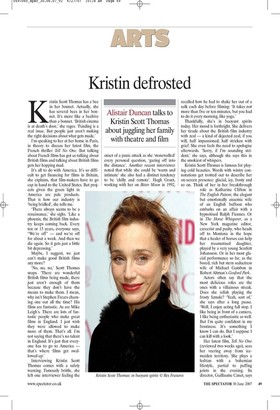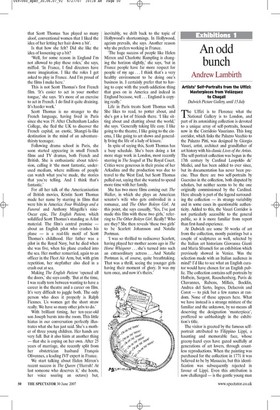Kristin defrosted
Alistair Duncan talks to Kristin Scott Thomas about juggling her family with theatre and film Kristin Scott Thomas has a bee in her bonnet. Actually, she has several bees in her bonnet. It's more like a beehive than a bonnet. 'British cinema is at death's door,' she rages. 'Funding is a real issue. But people just aren't making the right decisions about what gets made.'
I'm speaking to her at her home in Paris, in theory to discuss her latest film, the French thriller Tell No One. But talking about French films has got us talking about British films and talking about British films gets her hopping mad.
It's all to do with America. It's so difficult to get financing for films in Britain, she explains, that film-makers have to go cap in hand to the United States. But projects given the green light in America are pale products. That is how our industry is 'being bridled', she tells me.
'There always seems to be a renaissance,' she sighs. 'Like a phoenix, the British film industry keeps coming back. Every ten or 15 years, everyone says, "We're off" — and we're off for about a week. And then we die again. So it gets just a little bit depressing.'
Maybe, I suggest, we just can't make good British films any more?
'No, no, no,' Scott Thomas snaps. 'There are wonderful British films being made, there just aren't enough of them because they don't have the means to make them. I mean, why isn't Stephen Frears churning one out all the time? His films are fantastic. As are Mike Leigh's. There are lots of fantastic people who make great films in England. I just wish they were allowed to make more of them. That's all. I'm not saying that there's no talent in England. It's just that everyone has to go to America — that's where films get swallowed up.'
Interviewing Kristin Scott Thomas comes with a safety warning. Famously brittle, she left one interviewer feeling the onset of a panic attack as she 'stonewalled' every personal question, 'gazing off into the distance'. Another recent interviewer noted that while she could be 'warm and intimate' she also had a distinct tendency to be 'chilly and remote'. Hugh Grant, working with her on Bitter Moon in 1992, MIN recalled how he had to shake her out of a sulk each day before filming: 'It takes not more than five or ten minutes, but you had to do it every morning, like yoga.'
Thankfully, she's in buoyant spirits today. Her mood is forthright. She delivers her tirade about the British film industry with zeal — a kind of dejected zeal, if you will, half impassioned, half stricken with grief. She even feels the need to apologise afterwards. 'Sorry, if I'm sounding strident,' she says, although she says this in the smokiest of whispers.
Kristin Scott Thomas is famous for playing cold beauties. Words with wintry connotations get trotted out to describe her on-screen presence: glacial, icy, frosty and so on Think of her in her breakthrough role as Katharine Clifton in The English Patient, the elegant but emotionally anaemic wife of an English buffoon who embarks on an affair with a hypnotised Ralph Fiennes. Or in The Horse Whisperer, as a New York magazine editor, careerist and pushy, who heads off to Montana in the hope that a healer of horses can help her traumatised daughter, played by a very young Scarlett Johansson. Or in her most glacial performance so far, as the bored, rich but stern seductress wife of Michael Gambon in Robert Altman's Gosford Park.
Actors often say that the most delicious roles are the ones with a villainous streak. Does she relish playing the frosty female? 'Yeah, sort of,' she says after a long pause. 'Well, I enjoy acting full stop. I like being in front of a camera, I like being enthusiastic as well. But I'm quite confident in my frostiness. It's something I know I can do. But I suppose I can kill with a look.'
Her latest film, Tell No One (reviewed two weeks ago), sees her veering away from icemaiden territory. She plays a lesbian with a bohemian lifestyle, partial to puffing joints in the evening. Its director, Guillaume Canet, says that Scott Thomas 'has played so many aloof, conventional women that I liked the idea of her letting her hair down a bit'.
Is that how she felt? Did she like the idea of loosening up a bit?
'Well, for some reason in England I'm not allowed to play these roles,' she says, miffed. 'In France, I find directors have more imagination. I like the roles I get asked to play in France. And I'm proud of the films I make here.'
This is not Scott Thomas's first French film. 'It's easier to act in your mother tongue,' she says. 'It's more of an exercise to act in French. I do find it quite draining. It's harder work.'
Scott Thomas is no stranger to the French language, having lived in Paris since she was 19. After Cheltenham Ladies College, she fled the UK to discover the French capital, an exotic, Shangri-la-like destination in the mind of an adventurethirsty teenager.
Following drama school in Paris, she soon started appearing in small French films and TV dramas, both French and British. She is enthusiastic about television, calling it `the most fantastic, underused medium, where millions of people can watch what you've made, the stories that you're telling. And I think that's fantastic.'
For all her talk of the Americanisation of British movies, Kristin Scott Thomas made her name by starring in films that were hits in America: Four Weddings and a Funeral and Anthony Mingella's nineOscar epic, The English Patient, which solidified Scott Thomas's standing as A-list material. The film's central premise — about an English pilot who crashes his plane — is a real-life motif of Scott Thomas's childhood. Her father was a pilot in the Royal Navy, but he died when she was five, when his plane crashed into the sea. Her mother remarried, again to an officer in the Fleet Air Arm, but, with grim repetition, her stepfather also died in a crash out at sea.
Making The English Patient 'opened all the doors,' she says coolly. 'But at the time, I was really torn between wanting to have a career in the theatre and a career on film It's very difficult to juggle both. The only person who does it properly is Ralph Fiennes. Us women get the short straw really. We have so many other jobs to do.'
With brilliant timing, her ten-year-old son Joseph bursts into the room. This little hiatus in our conversation perfectly illustrates what she has just said. She's a mother of three young children. Her hands are very full. But it also hints at another thing — that she is coping on her own. After 25 years of marriage, she recently split from her obstetrician husband Francois Olivennes, a leading IVF expert in France.
We start talking about Helen Mirren's recent success in The Queen ('Hurrah! At last someone who deserves it,' she hoots, her voice soaring an octave) but, inevitably, we drift back to the topic of Hollywood's shortcomings. In Hollywood, ageism prevails, she says. Another reason why she prefers working in France.
'The huge success of people like Helen Mirren and Charlotte Rampling is changing the horizon slightly,' she says, 'but in France people have far more respect for people of my age. . . I think that's a very healthy environment to be doing one's business in. I certainly prefer that to having to cope with the youth-addiction thing that goes on in America and indeed in England because, well. . . England is copying really.'
Life in Paris treats Scott Thomas well. She likes to read, to potter about, and she's got a lot of friends there. 'I like sitting about and chatting about the world,' she says. 'Generally taking life easy. I like going to the theatre, I like going to the cinema, I like going to art shows and generally living the life of a lady of leisure.'
In spite of saying this, Scott Thomas has a busy schedule. She's been doing a lot more stage work in London, most recently starring in The Seagull at The Royal Court. Critics were generous in their praise of her Arkadina and the production was due to travel to the West End, but Scott Thomas pulled out, saying that she wanted to spend more time with her family.
She has two more films coming out: The Walker, in which she plays an American senator's wife who gets embroiled in a romance, and The Other Boleyn Girl. At this point, she says casually, 'Yes, I've just made this film with these two girls,' referring to The Other Boleyn Girl. Really? Who are they? She then reveals 'these two girls' to be Scarlett Johansson and Natalie Portman.
'I was so thrilled to rediscover Scarlett, having played her mother aeons ago in The Horse Whisperer. . . she's turned into such an extraordinary actress. . . And Natalie Portman is, of course, quite breathtaking. That was a thrill, seeing the younger girls having their moment of glory. It was my turn once, and now it's theirs.'



















































































 Previous page
Previous page